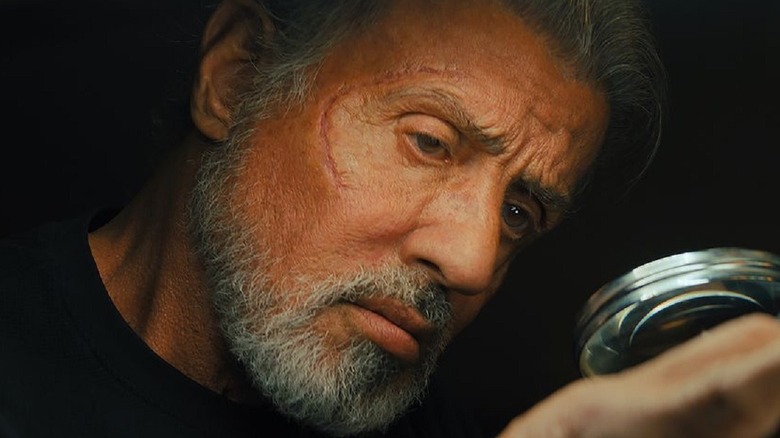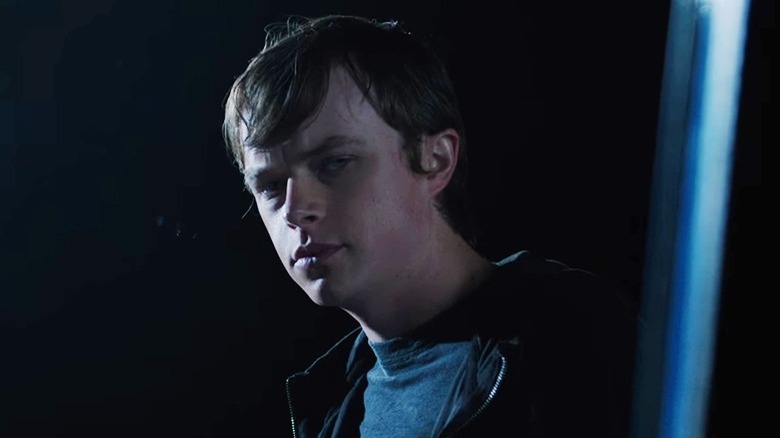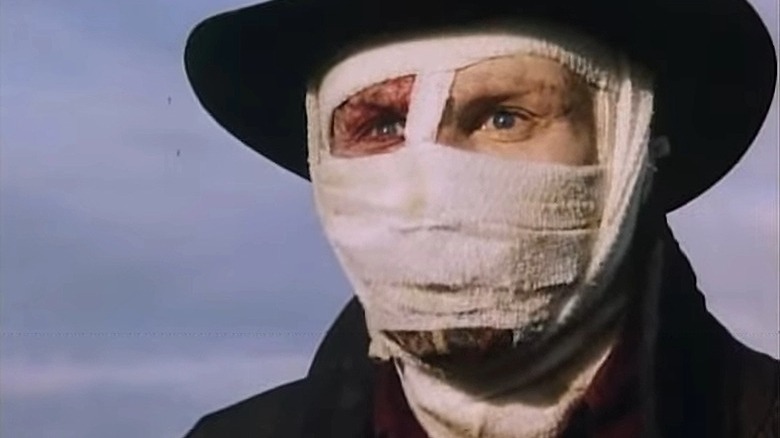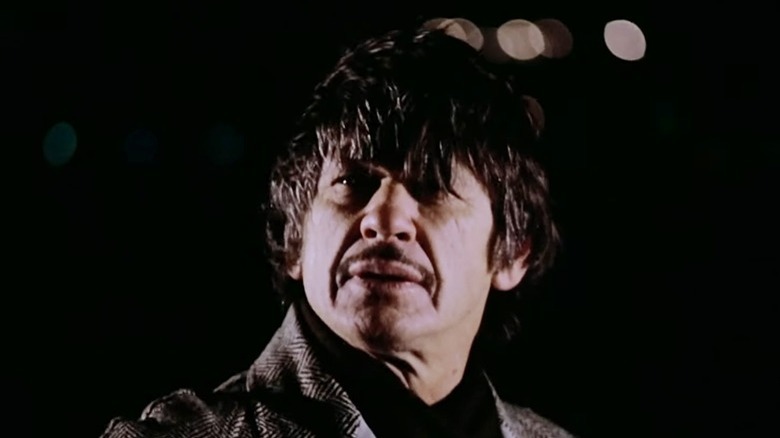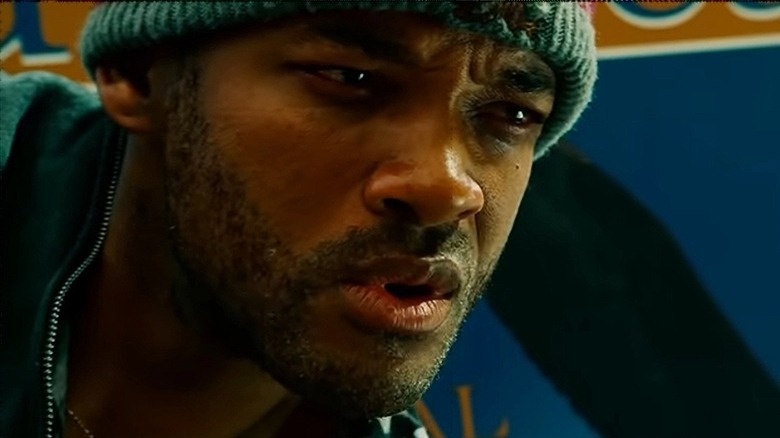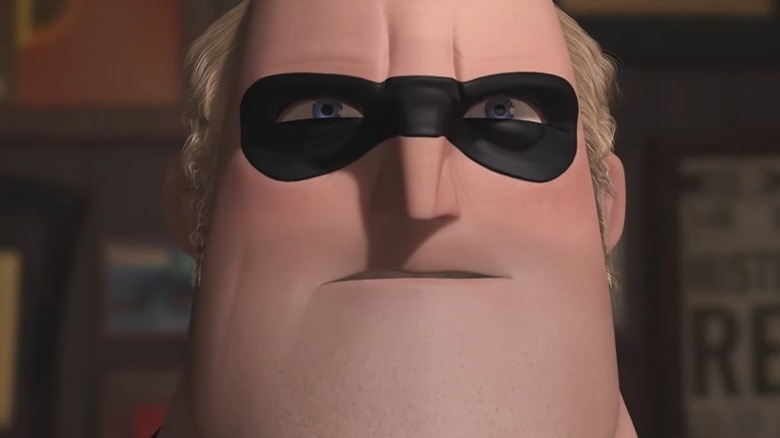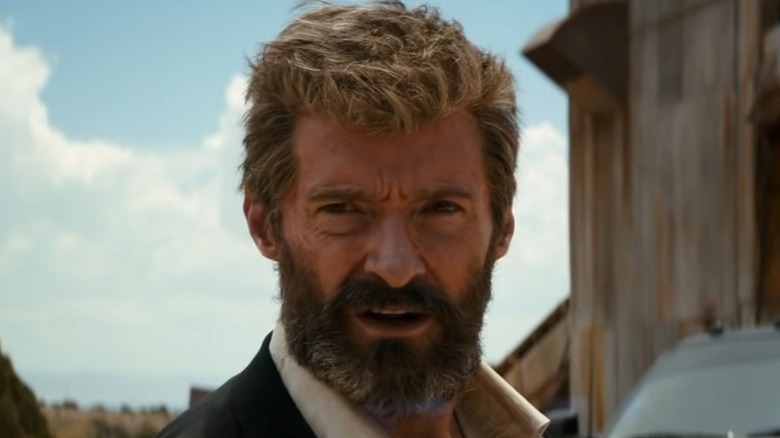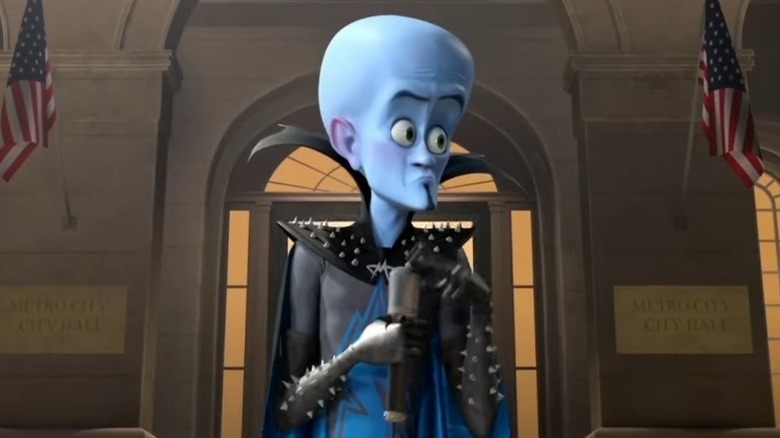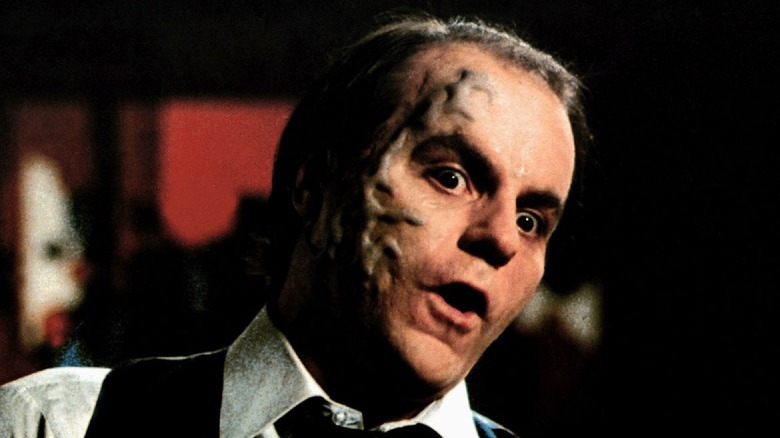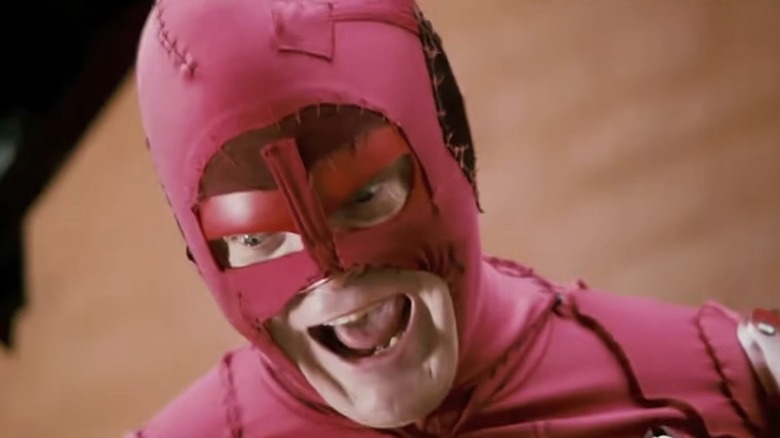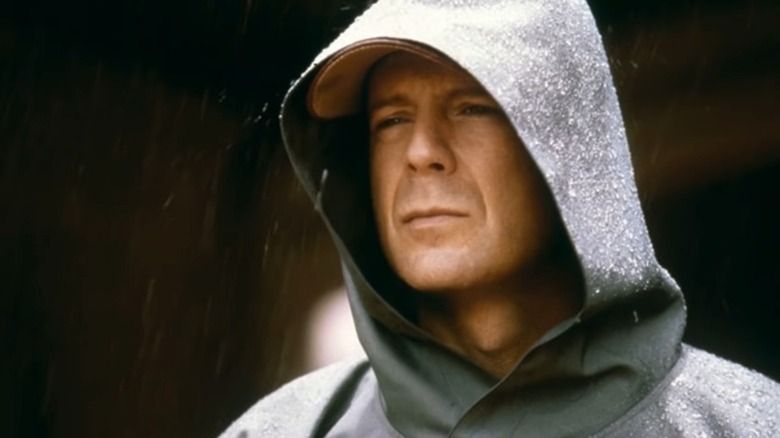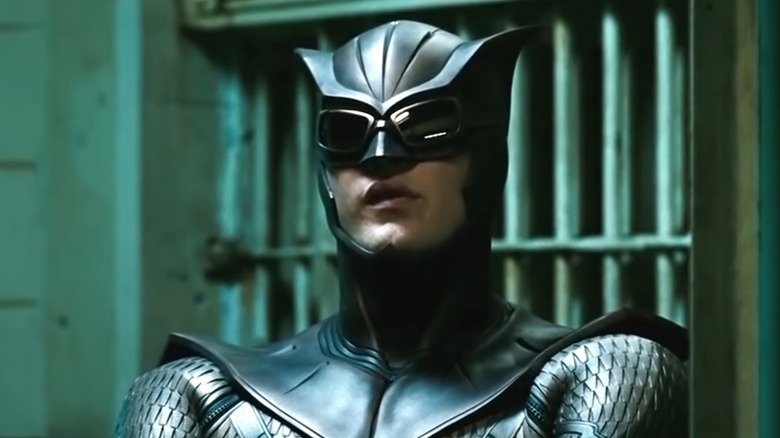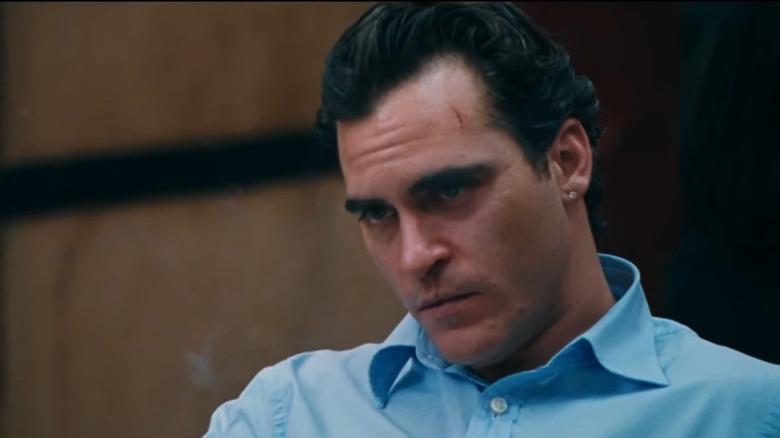12 Best Movies Like Samaritan Fans Should Check Out Next
"Samaritan" from writer Bragi F. Schut (perhaps best known for developing the story and scripting "Escape Room") and director Julius Avery ("Overlord") sets out to bring a different kind of superhero story into the current superpower-dominated film landscape. Set in Granite City, the movie focuses on young teenager Sam Cleary (Javon Walton), who maintains hope that despite all evidence to the contrary, the metropolis's hero, Samaritan, did not die 20 years earlier in battle with his brother and worst enemy Nemesis. Instead, Sam becomes certain that his quiet sanitation worker neighbor (Sylvester Stallone) Joe is the hero. As Granite City grows increasingly lawless and violent, Sam tries to convince Joe to come out of retirement and save its citizens once more. But is Joe still the hero Sam believes him to be in "Samaritan"? Was he ever?
Focusing on smaller-scale action and interpersonal interaction over loud CGI sequences and quips, "Samaritan" has proven an enjoyable deviation from the norm for superhero fans who want a different approach to the material. For those reading this who might fight that bill, this list offers 12 more movies that should scratch a similar itch.
Chronicle
When high school senior Steve (Michael B. Jordan) ropes in Andrew (Dane DeHaan) and Andrew's cousin Matt (Alex Russell) into coming with him to film an unknown object, the trio experience a blackout. Over the days that follow, they begin to develop telekinetic abilities. The 2012 found footage feature "Chronicle" follows the three as their powers — and the need to use them properly — increase.
Unfortunately, incredible powers don't always lead people to become heroes. Andrew's chaotic home life — his mother is dying of cancer, and his father is not a good role model — has eroded his happiness and confidence for years. Additionally, until very recently, he's been an outcast at school with no friends, only his sympathetic cousin. When an incident at a party leaves the unhappy team humiliated and enraged, it sets off a string of events that places Andrew, Steve, and Matt all in incredible danger.
As with "Samaritan," there is a sense of reality to "Chronicle" that grounds the film even as the characters' powers begin to grow exponentially. While the stunts are arresting, made all the more so by the way the found footage approach makes viewers feel like they're almost literally there, the movie is more focused on the consequences of these "gifts" than on how cool they look. It is a low-budget stunner with big thoughts on the brain.
Darkman
Dr. Peyton Westlake (Liam Neeson) had two passions in life: his work — the development of a synthetic skin intended to help burn victims — and his fiancée Julie Hasting (Frances McDormand). When Hasting stumbles upon a document showing developer Louis Strack Jr. (Colin Friels) has been bribing officials to fast-track his redevelopment of the city, she unknowingly endangers Westlake. At work late, trying to solve the problem of why the synthetic skin degenerates after 99 minutes in the light, Westlake finds himself face to face with brutal gangster Durant (Larry Drake). Durant believes Westlake must either have the document in question or know where it is stashed. When Westlake doesn't cooperate, Durant attempts to murder the scientist and his lab assistant.
However, Westlake somehow survives, albeit burnt beyond all recognition, unable to feel pain, and mentally shattered. Using his synthetic skin and a gift for impersonation, the badly scarred man embarks on a new mission as Darkman. He intends to dismantle Durant's criminal organization, protect Hasting, and get vengeance for his disfigurement.
While decidedly more over the top — and gloriously so, thanks to Sam Raimi's direction — "Darkman" shares a certain small-scale budget and sensibility with "Samaritan." It also involves a possible hero seeking to utterly destroy a criminal gang to save the soul of a city, like the Sylvester Stallone actioner.
Death Wish
The granddaddy of all modern vigilante films, the first "Death Wish" is a brutal, angry affair. When a home invasion degenerates into architect Paul Kersey's (Charles Bronson) wife Joanna and daughter Carol's horrifying dual assault, Joanna dies from her wounds, and Carol can't process the trauma, lapsing into a catatonic state. It also begins a process that will break the heretofore relatively mild-mannered family man, sending him spiraling into violent vigilantism.
Despite being a contentious objector in the Korean War and pledging never to use a gun after his father died in a hunting accident, Paul goes back on his pledge and begins to carry a firearm. Before long, he finds reason to use it against a mugger, an experience that initially sickens him but soon becomes an obsession. As his acts of violence increase, the police and the DA's office struggle with how to deal with him without sparking a full-blown wave of citizen violence.
For fans of "Samaritan" who want to see a similar story explored in less a science fiction — although arguably no less fanciful — way, "Death Wish" may prove a dark delight. Grimy and violent, the first installment of the increasingly ridiculous franchise is an interesting exploration of the temptations of taking the law into one's own hands.
Hancock
John Hancock (Will Smith) could have been his world's Superman. Instead, he became a grumpy misanthrope. He still uses his superpowers ostensibly to do good but hates every moment of it. Often, Hancock does more damage to the city than your average supervillain left to their own devices might. However, when he saves Ray Embrey (Jason Bateman), Hancock finds a friend and ally in the PR manager. Ray wants the world to see the good in Hancock and wants Hancock to believe in it, too. Unfortunately, Ray's mission proves so successful it draws the attention of an enemy Hancock hasn't faced in decades.
For Smith, who often struggles to play against type, his turn as the titular "Hancock" is a wonderful skewering of the star's natural charisma. Yet, as profoundly unlikable as he is, viewers can't help but invest in the character because the actor finds a way to mix his charm into the superpowered man's deeply unpleasant ways.
In addition to the theme of reluctant heroism, a third act twist links "Hancock" to "Samaritan." Unfortunately, for many viewers — and critics — the twist was a step too far, a revelation that undermined the storytelling that came before and made for a disappointing climax. For fans of twists who like the linked enemies conflict in "Samaritan," though, this late in the game reveal will likely improve, not detract from, the rest of the film.
The Incredibles
At first blush, the idea that "The Incredibles" might share anything in common with "Samaritan" seems unlikely. However, while the two tales take decidedly different routes along the way, they do open at surprisingly similar starting points.
As with The Samaritan, Mr. Incredible (Craig T. Nelson) and Elastigirl (Holly Hunter) have been forced into retirement and hiding. Now living as Bob and Helen Parr, the two former heroes struggle to find the same joy in suburban life as they once did in superheroics. They also must actively keep their superpowered children Violet (Sarah Vowell) and Dash (Spencer Fox) from using their gifts. For shy Violent — who can turn invisible — this seems easy enough, but energetic super speedster Dash hates every moment of it.
Again, as in "Samaritan," an unresolved threat from the past forces the Incredibles to give up their secluded lives and fight back. In the live-action Avery film, that's a powerful weapon, a hammer forged by the supervillain Nemesis. Here it is a bitter would-be sidekick, Syndrome (Jason Lee), who's decided to dedicate himself to eradicating "supers" so people like him never have to feel less than special again. If the ambivalence and sense of unintended consequences forcing a hero into action appealed to you in "Samaritan," "The Incredibles" is a colorful, more joyous take on those themes.
Logan
Taking place years after the 20th Century Fox X-Men films did, "Logan" unfolds on a subtly dystopic landscape where no mutants have been born in over two decades. Logan (Hugh Jackman), his healing factor slowly breaking down, spends his days as a limo driver. When not behind the wheel, he cares for an increasingly ill and dangerous Professor X (Patrick Stewart) with the help of Caliban (Stephen Merchant). While clearly deeply unhappy, Logan refuses to interact with the world in any way, preferring the company of a bottle.
Laura (Dafne Keen), a pre-teen girl with claws and a healing factor like Wolverine, forces Logan out of his routine. Actively being hunted by shadowy forces, he's her only hope of reaching a supposed mutant sanctuary near the border between America and Canada. Despite years of cynicism and indifference, Logan quickly finds he can't turn off his desire to help.
A more tragic — and arguably more emotionally fulfilling — take on a cynical superpowered man becoming a hero once again, "Logan" is a surprising violent goodbye to Jackman's exemplary work on the character. A must for X-Men films or comics fans and an excellent double bill for "Samaritan."
Megamind
When Megamind (Will Ferrell) and Metro Man's (Brad Pitt) families simultaneously launch them from their dying planets towards Earth, the two babies initially follow nearly the same path until they arrive in Metro City. Unfortunately, Metro Man ends up taken in by a wealthy family and spends his childhood in an enormous, gorgeous mansion. Meanwhile, Megamind lands in a prison where the inmates raise him. As the years go on, Metro Man has fate shine on him while Megamind gets the short end of the stick. Metro Man inevitably becomes the city's hero, and Megamind feels he has no other choice but to become its chief villain and Metro Man's number one antagonist.
When Megamind somehow successfully defeats Metro Man, seemingly killing him, he's surprised to find himself growing bored in his victorious state. So he seeks to develop a worthy nemesis by injecting Hal Stewart (Jonah Hill) with Metro Man DNA. Unfortunately, rather than turn hero, Stewart christens himself Tighten (thinking it's the proper way to spell "Titan") and goes full villain. Finding himself no longer Metro City's most dangerous villain, Megamind feels motivated to become its hero instead.
Another tale of linked enemies — while not literally brothers, Metro Man and Megamind's histories intertwine nearly as much — and reluctant superheroics, "Megamind" is obviously a much sillier affair than "Samaritan." Still, its themes of not denying your gifts and stepping up when you're needed, even if it seems out of character, are well done.
Scanners
David Cronenberg's seventh film overall, but his first to truly breakthrough into the mainstream, "Scanners" marries the writer-director's gift for body horror with a classic science fiction conceit. Cameron Vale (Stephen Lack) is a homeless man seemingly suffering from significant mental health issues. However, when Dr. Paul Ruth (Patrick McGoohan) gets ahold of him, he's able to dose Vale with a medication that gets his powers under control. Vale, it seems, is a scanner, a human with telepathic, telekinetic, biopathic, and empathic abilities. While many lived life like Vale, Ruth has recently been trying to round them up and similarly help them manage their capabilities.
Two other rival groups of scanners are also gathering forces. Darryl Revok (Michael Ironside) leads a group seeking to use their powers for ill and to dominate non-scanner humans. Kim Obrist (Jennifer O'Neill) is part of a more benevolent collection of scanners who are supporting one another and attempting to oppose Revok's goals. Before long, Obrist and Vale must team up against the increasingly powerful — and sociopathic — Revok in a battle of wills. One that only grows more complicated with the revelation that Vale and Revok are brothers.
Cronenberg uses his limited resources to their full effect here, which should appeal to fans of the film's smaller budget aspirations. Additionally, "Scanners" offers another take on the "superpowered brothers forced to fight" motif and a final twist that mirrors the last act "Samaritan" spoiler.
If you or someone you know needs help with mental health, please contact the Crisis Text Line by texting HOME to 741741, call the National Alliance on Mental Illness helpline at 1-800-950-NAMI (6264), or visit the National Institute of Mental Health website.
Super
In "Samaritan," Joe appears to have superpowers but is incredibly reticent to use them. By contrast, Frank Darbo (Rainn Wilson) has no superpowers and isn't even particularly athletic and yet cannot wait to throw on a costume and fight crime. By striking it with a wrench.
Fans of writer-director James Gunn's sensibilities from films like "Guardians of the Galaxy" will likely spot much of what they love about his films in this earlier work. And they'll spot a lot more of it as Gunn lets his anarchic sense of humor and delight in the gross take a lot more ground to run here. As the Crimson Bolt, Frank is a violent malcontent who is barely a good guy because he's at least hitting criminals. His sidekick, Boltie (Elliot Page), is every bit as enthusiastic if even more attracted to the bloodshed. It's costumed vigilantism at its most selfish, reckless, and randomly violent.
This is a big step away from "Samaritan" in terms of tone and execution. Still, for viewers who might like to see what happens when people who absolutely shouldn't be heroes dive in feet first as a chaser to a film where someone who absolutely should be a hero resists the call time and again, "Super" is a wild, vulgar pleasure. It feels like "Samaritan"'s brightly colored, deeply dangerous cousin.
Unbreakable
"There is a sole survivor... and he is miraculously unharmed." For Elijah Price (Samuel L. Jackson), those are the magic words, evidence of a superhero in the real world. When security guard David Dunn (Bruce Willis) survivors a horrifying train wreck, Price finds his real-life Superman. Unfortunately, Dunn doesn't believe he has powers. And even if he does, he wants no part of being a hero.
Price's theory, however, does inspire Joseph (Spencer Treat Clark), David's son. While the man might not believe himself a hero, Joseph certainly can see his dad fitting the bill. His son's faith, in turn, spurs Dunn to accept his abilities and try and use them for more than just working security at the college football stadium.
In terms of tone and perspective, "Unbreakable" is probably the closest film on this list to "Samaritan." Both Stallone's Joe and Willis' David have a similar powerset. Both are deeply ambivalent about their abilities, and both need a child's belief to force the past that ambivalence who believes they can be more. "Unbreakable" also has much more on its mind about mythology, the nature of evil, and the storytelling power of comic books. For those who liked "Samaritan" but felt hungry for a similar story with deeper thematic resonance and a stronger sense of cinematic style, "Unbreakable" will fit the bill nicely.
Watchmen
When talking about retired superheroes, there is no single greater text on the matter than Alan Moore and Dave Gibson's 12-part series for DC Comics, Watchmen. The film adaptation, directed by Zack Snyder and written by David Hayter and Alex Tse, has proven divisive over the years. It received neither the near-universal praise the comics series nor the same level of celebration as the 2019 HBO spinoff series of the same name. Nonetheless, for viewers who like "Samaritan" but wanted a far more expansive pallet and a much more intensive sense of directorial style, "Watchmen" will likely satisfy.
Set eight years after legislation outlawed "masks," "Watchmen" explores what happened to the costumed vigilantes forced to hang it up. Some became government-sponsored agents, like Doctor Manhattan (Billy Crudup) or The Comedian (Jeffrey Dean Morgan). Others like Nite-Owl (Patrick Wilson) just left it behind. Rorschach (Jackie Earle Haley) refused either route, continuing to act as a vigilante while growing increasingly more violent and anti-social over time.
When Rorschach discovers what seems to be a conspiracy to kill masks, it forces Nite-Owl and the likes of Silk Spectre (Malin Ackerman) and Ozymandias (Matthew Goode) to contemplate suiting up once again. However, things are far more complex than they seem. There is a conspiracy but it's about far more than a handful of costumed do-gooders.
We Own the Night
Nightclub owner Bobby Green (Joaquin Phoenix) is actually Bobby Grusinsky, son of New York Police Department Deputy Chief Burt Grusinsky (Robert Duvall) and brother of striving cop Joe Grusinsky (Mark Wahlberg). Bobby took his mom's maiden name and distanced himself from the family to enjoy an amoral party guy lifestyle. As Bobby Green, he thinks he can avoid suspicion from the criminal types that enjoy his nightclub and guilt from his thin blue line family members.
When Joe decides to raid Bobby's club in search of mobster Vadim Nezhinski (Alex Veadov), that tenuous division crumbles. Bobby refuses to cooperate, and, as a result, Nezhinski skates as the City can't build a case. Now free, the gangster targets Joe, shooting him and blowing up his car. Bobby can't ignore the criminals in his midst any longer and joins the family tradition of law enforcement.
While completely devoid of superpowers, "We Own the Night" captures the motif of brothers on opposite sides of the law. While Wahlberg has a long history of playing cops — and playing them well — his Joe is unusual, making an especially compelling vulnerable character after his near-death. Phoenix has a lot of fun as the hedonistic version of Bobby and is just as convincing when he turns reformed. The sense of melancholy and missed opportunities that undergirds Stallone's Joe's feelings about his brother are here as well in an even richer way as we get to see how fractured the sibling relationship was at the start.
